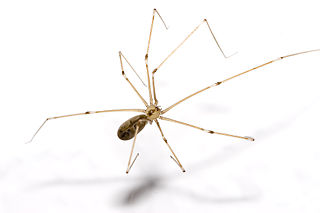
The Pholcidae are a family of araneomorph spiders. The family contains over 1,800 pholcids, including those commonly known as the marbled cellar spider , daddy long-legs spider, granddaddy long-legs spider, carpenter spider, daddy long-legger, vibrating spider, gyrating spider, long daddy, and skull spider. The family, first described by Carl Ludwig Koch in 1850, is divided into 94 genera.

Anyphaenidae is a family of araneomorph spiders, sometimes called anyphaenid sac spiders. They are distinguished from the sac spiders of the family Clubionidae and other spiders by having the abdominal spiracle placed one third to one half of the way anterior to the spinnerets toward the epigastric furrow on the underside of the abdomen. In most spiders the spiracle is just anterior to the spinnerets. Like clubionids, anyphaenids have eight eyes arranged in two rows, conical anterior spinnerets and are wandering predators that build silken retreats, or sacs, usually on plant terminals, between leaves, under bark or under rocks. There are more than 500 species in over 50 genera worldwide.

Chrysilla is a genus of jumping spiders that was first described by Tamerlan Thorell in 1887. Several species formerly placed here were transferred to Phintella, and vice versa. Females are 3 to 4 millimetres long, and males are 4 to 9 millimetres long. The genus is Persian, derived from the Greek Χρύσιλλα.

Wulfila is a genus of ghost spiders first described by O. Pickard-Cambridge in 1895. They are easily recognized by their pale white elongated legs.

Wulfila saltabundus is a species of ghost spider in the family Anyphaenidae. It is found in the United States and Canada.
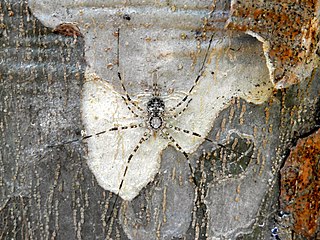
Neotama mexicana, also known as the long-spinneret spider or Mexican two-tailed spider, is a species of tree trunk spider in the family Hersiliidae. It is found in a range from the United States to Peru and Guyana.

Hentzia mitrata, the white-jawed jumping spider, is a species of jumping spider in the family Salticidae. It is found in the United States, Canada, and Bahama Islands.
Habronattus sansoni is a species of jumping spider in the family Salticidae. It is found in the United States and Canada.
Pityohyphantes costatus, the hammock spider, is a species of sheetweb spider in the family Linyphiidae. It is found in the United States.
Ceraticelus emertoni is a species of dwarf spider in the family Linyphiidae. It is found in the United States.
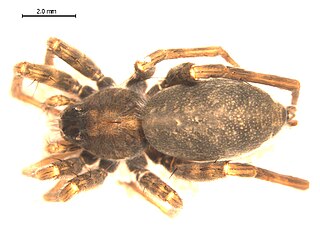
Pardosa lapidicina, the stone spider, is a species of wolf spider in the family Lycosidae. It is found in the United States and Canada.
Xysticus emertoni, or Emerton's crab spider, is a species of crab spider in the family Thomisidae. It is found in the United States, Canada, Slovakia, Russia, and a range from Central Asia to China.

Pirata piraticus is a species of wolf spider in the family Lycosidae. It is found in North America, Europe, Turkey, Caucasus, a range from Russia, Central Asia, China, and Japan.

Theridion murarium is a species of cobweb spider in the family Theridiidae. It is found in North America.
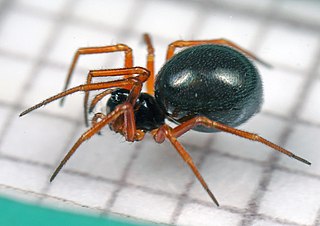
Entelecara acuminata is a species of dwarf spider in the family Linyphiidae. It is found in the United States, Europe, Russia (Sibiria), and Central Asia.
Phrurotimpus borealis is a species of true spider in the family Phrurolithidae. It is found in North America.

Phidippus apacheanus is a species of jumping spider in the family Salticidae. It is found in the United States, Mexico, and Cuba.
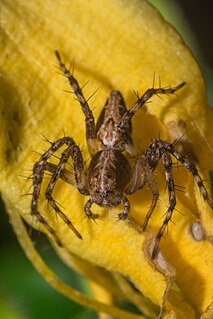
Oxyopes scalaris, the western lynx spider, is a species of lynx spider in the family Oxyopidae. It is found in North America.











